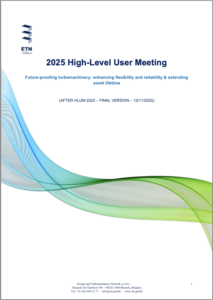- Three energy futures: Defining the role of turbomachinery in 2030–2040
- ETN Global’s last Quarterly Newsletter of 2025 is out
- ETN Global calling for Board candidates for 2026-2028 term
- President’s annual message to ETN Global members 2025
- Discussing turbomachinery strategies in a shifting energy landscape

Latest News
Read more ETN Global publishes HLUM 2025 executive report: three barriers, one unified direction
ETN Global publishes HLUM 2025 executive report: three barriers, one unified direction
On 12 November 2025 ETN Global has released the Executive Report of the High-Level User Meeting (HLUM) 2025 (login required), capturing the unified perspective of gas turbine end-users across utilities, energy companies, and industry. This year’s report reflects insights gathered from two High-Level User Meetings: a regional session focused on the Americas, hosted by Cheniere Energy in Houston on 6 October, followed by the international meeting held in Brussels on 13 October. Together, these events brought senior operators from across the world to address the most pressing operational challenges and define the strategic direction for the gas turbine sector.
The discussions in both meetings, supported by continuous user dialogue throughout the year, have been consolidated into the newly published HLUM 2025 report.
The report identifies three critical barriers prioritised by end-users as the most urgent and impactful:
1. Spare parts availability & turnaround time
Persistent supply chain fragility with long lead times continues to reduce operational flexibility and disrupt outage planning. Participants emphasised the need to move away from transactional supplier relationships toward partnership-based models built on transparency, shared forecasting, and expanded repair capacity.
2. Uncertain policy and regulatory frameworks
Operators across regions face inconsistent and rapidly changing regulations for hydrogen, CCUS, and flexible thermal assets. The report calls for stable, long-term, and fuel-agnostic regulatory frameworks that support investment decisions and enable low-carbon project deployment.
3. Ageing fleets under changing operating conditions
Gas turbines originally designed for baseload operation are now required to cycle more frequently, resulting in increased wear and reduced maintenance predictability. End-users stressed the need for updated maintenance methodologies, on-site inspection capabilities, hybrid system solutions, and greater contractual flexibility.
Across both meetings, one message was clear: these challenges are systemic and interconnected. Addressing them requires collective leverage, such as shared data, transparent communication, and stronger collaboration across the value chain.
The full Executive Report is now available to ETN Global members at this link (login required)


